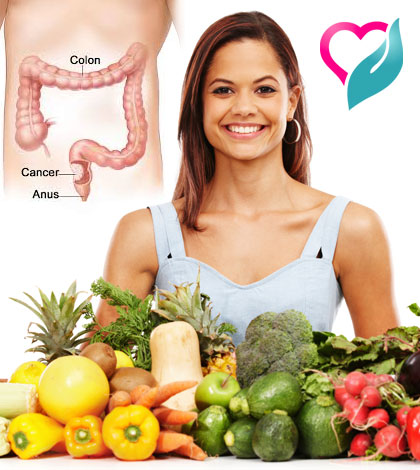Colon cancer is diagnosed in more than 130,000 people each year in US alone and more than 50,000 die from it. It is a common type of cancer that occurs in the lining and glands of the large intestine and rectum.
[wp_ad_camp_1]
It is a silent killer because cancer patients are almost non-symptomatic before the cancer reaches metastatic stages and treatment has little effect. The aggregation of pathogens and toxins in the colon is the most important instigator of tumor growth. This is why elderly, people with habitual constipation or have poor digestive functions are at high risk of developing this deadly disease.
About 90% of all colon cancers and found in people age 50 and older. For this reason, our recommendation is that you start checking for this cancer when you are 50. The best way to prevent colon cancer is by minimizing your exposure to toxins like smoke and alcohol, red and processed meat, MSG and other artificial flavor enhancers. Eat a high-fiber diet with lots of fruits and vegetables, especially those concentrated with powerful antioxidants that prevent infections and cancer growth. EHC brings you the following foods that will help you prevent colon cancer.
[wp_ad_camp_4]
Broccoli
Broccoli is the number one vegetable for disease and cancer prevention. Raw broccoli contains two of the most powerful anti-cancerous agents in nature, diinodylmethane and sulforaphane. The combined action of these two chemicals can effectively suppress tumor growth in even the more aggressive types of cancers.
Sweet Potatoes
Sweet potatoes are very effective for relieving constipation and irritable bowels, and they are considered a super-food for colon cancer prevention. Sweet potatoes are a rich source of complex carbohydrates, dietary fiber and antioxidant vitamins and minerals like beta carotene, vitamin C and E, pantothenic acid and manganese. High intake of these nutrients can speed up the movement of your bowels, reduce your colon’s exposure to toxins, and thus lower the likelihood of intestinal cell mutation. In addition, sweet potatoes also contain significantly amount of phytosterols, which is another key defense against colon cancer.
[wp_ad_camp_2]
Yogurt
The probiotic bacteria in yogurt balances your resident flora, and prevents the colonization of potential pathogens. Yogurt also accelerates your bowel movement, and those that are fortified with extra fiber are especially notable for promoting fast waste elimination. Yogurt is also the best source for easily absorbable calcium and vitamin D. Deficiency of these two nutrients can elevate your risk of colon cancer. The byproducts of yogurt digestion increase your colon acidity and create an inhibitory shield against polyps and tumor formation.
Tuna
Having enough selenium in your diet is critical to detoxification of your system and minimizing your risk of cell mutation. Tuna contains tremendous amount of selenium. A 3-ounce tuna fillet gives you nearly 60% RDI of selenium. Eating tuna also supplies you with significant amounts of essential omega-3 and omega-6 fatty acids.
Milk
Along with building strong bones, milk can help shield you from colon cancer. Data on more than a half million people showed that drinking at least a cup a day lowered the risk of cancers of the colon and rectum by about 15 percent. Drink two more glasses, and your risk drops by another 12 percent.
Cruciferous Vegetables
Vegetables like broccoli, broccolini, Brussels sprouts, cauliflower, cabbage, bok choy, kale, parsnips, turnips, rutabagas and kohlrabi are among the most powerful cancer fighters in the garden. They contain an array of compounds that flush out cancer-causing substances before they cause damage to cell DNA.
Turmeric
The natural yellow pigment in turmeric, called curcumin, is considered a top anticancer agent. It's strongly anti-inflammatory, quelling inflammation that's thought to contribute to tumor growth. It also helps clean out carcinogens before they can damage cell DNA, and it helps repair any damage already done. Lab studies show this spice also helps stop the growth and spread of cancer cells that do form.
Although the turmeric in curry powder mixes can turn your food yellow, some research suggests that several commercial curry powders don't actually contain much curcumin. It's better to use turmeric powder or, if you're using premixed curry powder, add some extra turmeric.
[wp_ad_camp_3]
Image courtesy: heartmdinstitute.com , sheknows.com ,




























